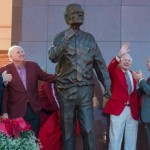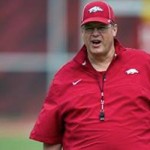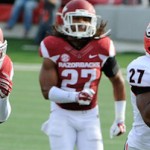 As the story has become legendary over the past 56 years, Lance Alworth was a prep football star out of Brookhaven, Miss., who couldn’t move into the Ole Miss dorm because he was married, one of the rules at the time for Johnny Vaught’s Rebels. So, instead, he ended up at Arkansas as Frank Broyles’ first big recruit as the Razorbacks’ head coach.
As the story has become legendary over the past 56 years, Lance Alworth was a prep football star out of Brookhaven, Miss., who couldn’t move into the Ole Miss dorm because he was married, one of the rules at the time for Johnny Vaught’s Rebels. So, instead, he ended up at Arkansas as Frank Broyles’ first big recruit as the Razorbacks’ head coach.
“What people miss about that story is that Lance Alworth was not just automatically coming to Arkansas when he couldn’t get into Ole Miss,” says Bruce James, another Mississippi star recruit that Broyles would woo later in the 1960s and who would make All-American as a defensive end. “He could have gone to Alabama, Auburn, Mississippi State, LSU, Georgia, any school he wanted to. Frank Broyles beat Bear Bryant, Shug Jordan and those other coaches for him.”
When it was legal under NCAA rules for the head coach to take on the nearly year-round recruiting of a prep star, Broyles usually got his man — from Alworth in his first recruiting class at Arkansas to All-American kicker Steve Little near the end of his coaching tenure. In the case of Alworth, who happened to like golf, Frank really had an ace in the hole here: he too loved golf. They sealed the deal for Arkansas at a private Memphis country club.
That recruiting class would be the backbone of a sudden breakthrough in the Southwest Conference like Arkansas fans had never seen. Broyles would coach the Hogs to no less than a share of the SWC title his second, third and fourth seasons with Alworth and Co., and beating Texas in 1960 started Arkansas on a successful run of recruiting players out of the Lone Star State — Jerry Lamb, Ronnie Caveness and Loyd Phillips just to name a few — the put the Hogs on close to equal footing with the Longhorns.
His fifth season saw Arkansas come within a fumble at the Texas goal line in the fourth quarter of perhaps a national championship. That national title came in year seven, when Arkansas finished as the last major unbeaten team in the country after a 10-7 Cotton Bowl win over Nebraska and was crowned No. 1 by two major polls, including the Football Writers Association of America.
Arkansas had never seen such fortune on the football field. The 1964 team’s 11 wins were part of a 22-game win streak over three years, ending in a 14-7 loss to LSU in the 1966 Cotton Bowl. The 1965 team, before the streak ended, was heralded by Sports Illustrated as perhaps “the new college football dynasty.” After a heartbreaking end to the 1966 season (8-2) and a down year in 1967, Broyles and the Razorbacks capped off the 1960s with a 10-1 season in 1968 and a 9-2 year in 1969, which included the fabled 15-14 loss to No. 1 Texas to end the regular season.
Broyles’ coaching career would come to a close at the end of the 1976 season, coincidentally against Texas and his coaching rival Darrell Royal, who was also calling it quits that night in Austin. Broyles remained on as athletic director until 2008, when Jeff Long assumed the post and Broyles’ title became “emeritus.”
And that all came to a close earlier this month in Fayetteville in a weekend of retirement events for the 89-year-old Broyles.
More than a few times, and not jokingly, he said he wanted to remain as athletic director until he was in his 90s, and even then he didn’t want to stop. That might have happened had it not been for some administrative missteps and the collapse of Houston Nutt’s coaching run in 2007. But that’s a story for later in this series.
For today’s reading, we look at the man who, beginning with an assistant coaching job at Baylor after his playing career at Georgia Tech ended, always eyed the Arkansas job.
Strange, that, considering Arkansas had only one a couple of SWC championships by 1948. But Arkansas was also under the athletic leadership of John Barnhill then, before illness forced Barney to the sidelines for a succession of coaches, one who struggled mightily, before Broyles got the call.
Otis Douglas was an NFL-trained assistant coach who replaced Barnhill beginning with the 1950 season, but his high-water mark was a 5-5 season in 1951. There was some talent on hand then; several Hogs from that era would go on to play in the NFL. Pat Summerall, a sometimes kicker, would go on to greatness as an announcer after a pro stint with the New York Giants.
Bowden Wyatt, who began the rebuilding process after the Douglas debacle, left after a 7-4 season in year 2 for his native Tennessee. Jack Mitchell, a former player under Bud Wilkinson at Oklahoma, had a six-win ceiling in the next three years before he high-tailed it to Kansas.
Broyles, after returning to his alma mater to coach with the legendary Bobby Dodd, kept waiting for John Barnhill to give him a chance at the Arkansas job. Barnhill wanted a leader with head coaching experience, something Broyles himself would lean on as an AD later.
Broyles got that experience in one season at Missouri. Although his only Tigers team, in 1957, went 4-5-1, again his recruiting when he arrived would set the table for a great run at Columbia for Dan Devine.
 St. Louis Post-Dispatch sports editor Bob Broeg would say Broyles “fled in the night” to the open Arkansas job in December 1957. Broyles asked Barnhill, “What took you so long” to hire him?
St. Louis Post-Dispatch sports editor Bob Broeg would say Broyles “fled in the night” to the open Arkansas job in December 1957. Broyles asked Barnhill, “What took you so long” to hire him?
In late October of 1958, in a scenario not unlike what Jeff Long endured last year with first year coach Bret Bielema, Barnhill may have been fielding the question, “Why did you hire this guy?”
Arkansas was 0-6. On the good side, the Hogs had played perennial powerhouse Ole Miss closely in that sixth loss. Things may not have been looking up to the average fan, but the Hogs Broyles had inherited (remember, he couldn’t use Alworth and those vaunted freshmen in his first season because of NCAA eligibility rules at the time) began figuring out what he wanted and how to do it right.
Arkansas sprung an upset on Texas A&M in College Station, and then ran off three more wins to end the season.
Another traditional saying was born: “They remember what you did in November.”
Broyles had that knack of saying it with that perfect Georgia drawl that made it unforgettable. Arkansas would also never forget how to win in November, not losing a game in the final month of the season until the struggling season of 1963, a full six years after Broyles began coaching the Hogs.
During all this time, Broyles had the perfect ally in the press in Orville Henry, who began editing the Arkansas Gazette sports page when he was a teen-ager in the later years of World War II.
When Broyles arrived and drove Arkansas fans into a frenzy with the early success over 1959-62, Razorback fans dwelt on every word from Orville Henry — from his often-three-page game stories that began on the Gazette front page, to his Monday analyses that were aided by Broyles’ revealing mind. He shared everything with Orville, and both knew what needed to be in print and what could stay in the notebook.
It’s a relationship between coach and sportswriter unlike anything today. It’s simply a different day of social media and numbers of TV, radio and newspaper people all coming down on one subject that make such a relationship next to impossible. Perhaps Houston Nutt had a confidant in Wally Hall, the Arkansas Democrat sports editor who would take Henry’s role when the latter departed the Gazette for the Democrat in 1990, but surely Bobby Petrino confided in no sole media outlet, and it doesn’t appear that Bielema has a Boswell these days either (though some might say he could use one the way Broyles had in 1958 when things looked darkest).
Orville and Frank were together right up to the coaching end. Henry had already been given the scoop by Broyles weeks earlier that the coach was stepping down after the season-ending Texas game in 1976, and Henry had agreed to sit on the story until that time. However, Harry King, then with the Associated Press, had caught wind of the retirement the week of the game and was ready to break the story, so Orville had to hurry his scoop into print.
It turned out, Frank’s announcement spurred his old buddy Darrell Royal to do the same and a nothing Arkansas-Texas game with two struggling teams turned into a night of farewells and tears.
Arkansas would have some rip-roaring success under Lou Holtz immediately after he took over the coaching job (but not Broyles’ office; the old coach kept that plush accommodation), and Orville had a quote-a-minute dynamo to cover as Razorback football stayed relevant for the next six years.
But, the truth of the matter is, looking back on a decade that fades further each year for the 50-something and older, and one that means nothing to the current UA students and the fans from 22 to 45, Arkansas has never enjoyed it quite as good as it did when Broyles commanded the sidelines at least through 1971. He would have a brief rekindling of the magic in 1975, before the retirement year.
Meanwhile, the older Arkansas fans grasp for that long-lost era to somehow be repeated in a game that has changed drastically in Fayetteville since the Big Shootout of 1969. The younger Razorback fans only wonder if that was a fable, or something as foreign to them as the country’s Civil War.
Alabama led the country in wins during the decade of the 1960s. Texas and Arkansas were deadlocked, right behind the Crimson Tide.
Texas has struggled of late but did win a 2005 national title and regularly is expected to contend for titles. Alabama under Nick Saban looks like the Tide under Bear Bryant, already with three national crowns in the past five years.
Arkansas had a moment of recent greatness when it reached No. 3 in the country under Bobby Petrino in 2011, its highest rating since 1982 with Holtz. Obviously, the Razorbacks’ football fortunes that soared so high under Broyles as a coach in his first 12 seasons took a long-lasting dip that coincided when he left a weekly football TV analyst job in the mid 1980s and focused his attention on being the athletic director.
Broyles was magic in the living rooms meeting with the high school stars’ moms when he coached, but he couldn’t recruit for the coaches who followed, and it showed. What Broyles could do is turn that Georgia charm on to the fat cats in Arkansas to open their wallets and help him build an all-sports success story through the year 2000.
NEXT WEEK: BROYLES AND HIS COACHES














